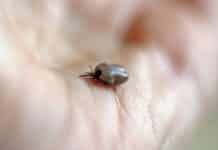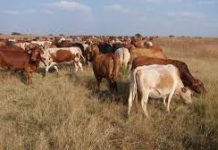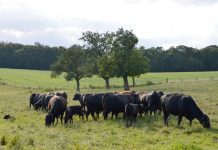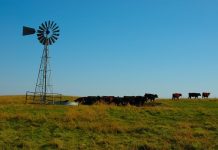Estimated reading time: 7 minutes
Heartwater is caused by the Ehrlichia ruminantium protozoa and affects both domestic and wild ruminants. It is carried by the bont tick, which is found throughout the country. It is essential to note that both the larva and adult bont tick transmit the disease. The larvae are not visible to the naked eye, often leading producers to mistakenly believe that because no adult ticks are visible, there is no risk of heartwater among their cattle.
Read more about heartwater’s impact on the livestock industry.
Disease signs
Animals will only start to show signs of disease from nine to 21 days after having been infected. In addition to the damage to muscles inflicted by the bont tick’s long mouth parts, its three-host status means there is an increased chance of heartwater spreading throughout the herd.
View other videos in the series.
Once the parasite has entered the animal’s body, it attacks the cells in the blood vessels, leading to inflammation and disturbances to blood circulation. This causes swelling and leaking of fluid into body tissues. It affects the brain, giving rise to the classic heartwater paddling and circling movements, as well as the lungs, leading to froth coming out of the nose at the terminal stage. The water in the heart sac and chest cavity is due to the damaged blood vessels.
Prevention
There are several ways to ensure that this fatal disease is kept away from your animals.
Multimodal tick control: The most obvious solution is to effectively control the ticks present on your farm. This means the application of different methods and products during different times of the year. Products include the following:
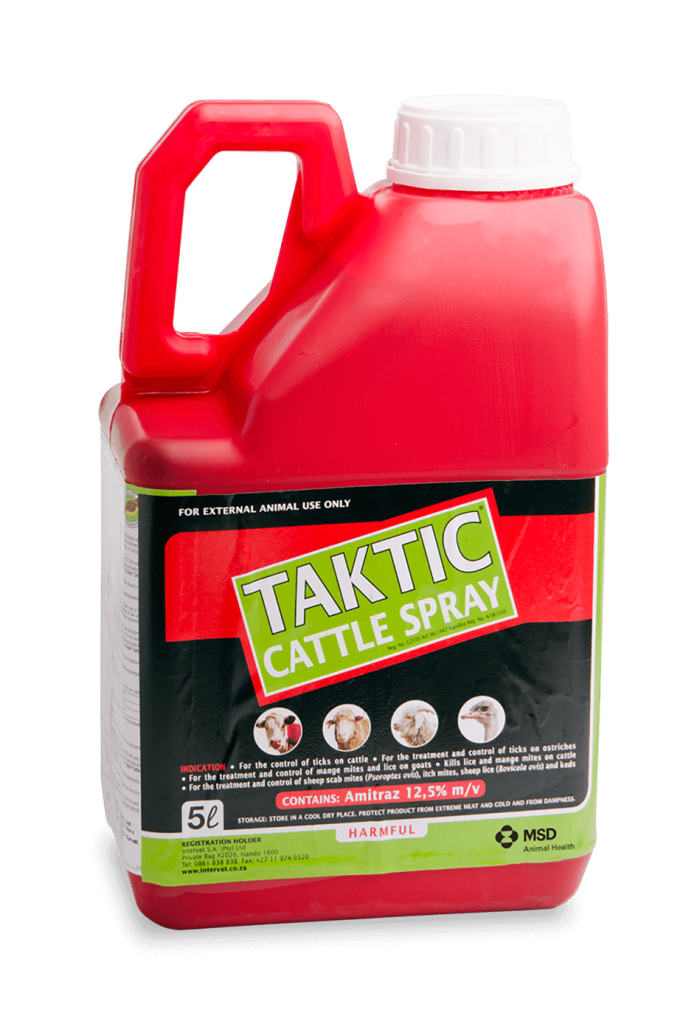
Taktic® Cattle Spray: This can be used in case of a high tick burden. It is mixed with water and the animal’s entire body must come into contact with the mixture for it to kill all the ticks. It is most efficient when used in a plunge dip or a spray race.
Taktic® Cattle Spray Reg. No. G2535 (Act
36/1947); Namibia Reg. No. V02/18.3.4/781 NS0.
Contains: amitraz 12,5 % m/v.

Delete® All: It is a dip that can be applied on the backline (cows) or in the armpits and around the anus and groin (sheep), from where it will spread over the animal’s body to kill any ticks it comes into contact with – it will also kill any new ticks that climb onto the animal. It also has a residual action, which depends on the grooming pattern, tick numbers and season of the year. Dipping is recommended during an outbreak to prevent losses, or during early spring when tick numbers start to increase.
Delete® All Reg. No. G2837 (Act 36/1947);
Namibia Reg. No. V01/18.3.9/664 NS0. Contains:
amitraz 2,0 % m/v, deltamethrin 0,50 % m/v and
piperonyl butoxide 2,0 % m/v.
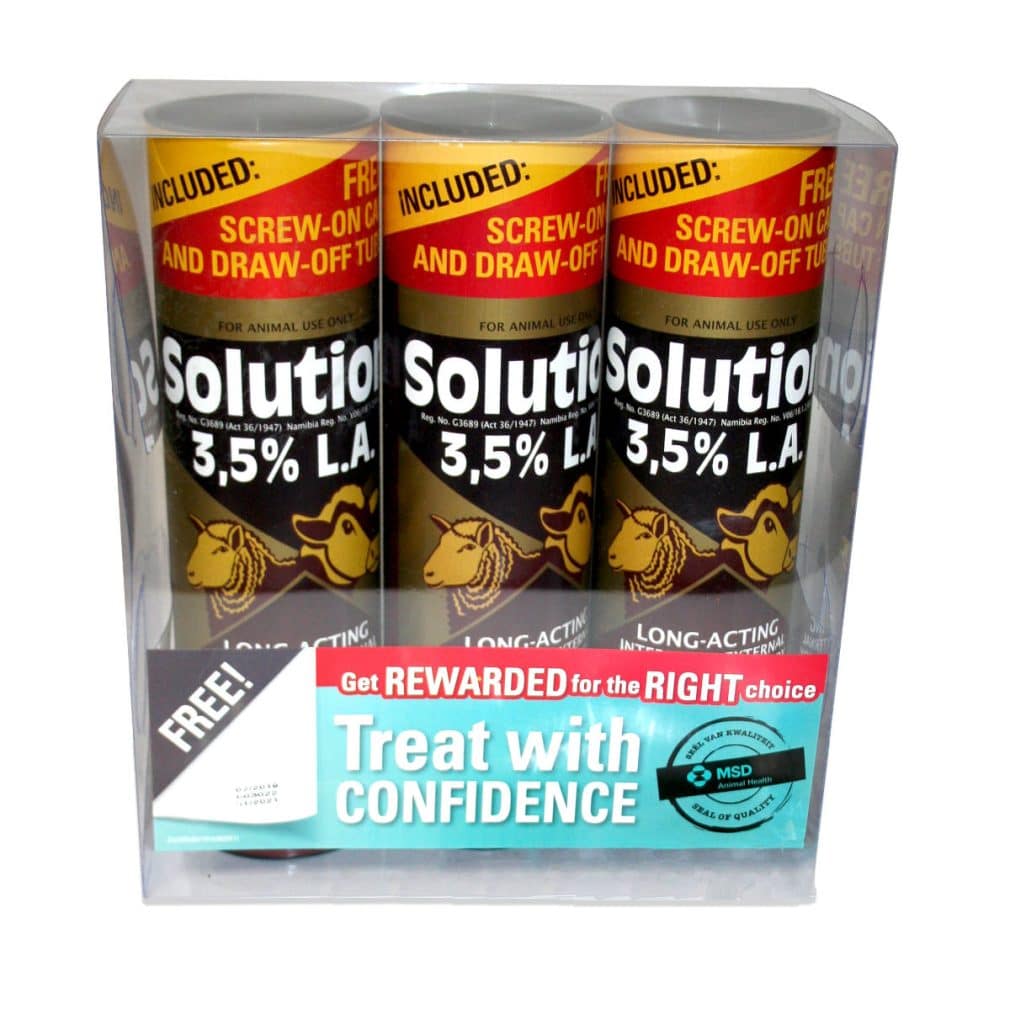
Solution® 3.5% LA: This product is injected subcutaneously and absorbed into the bloodstream. When the tick sucks the blood from an animal injected with Solution®3.5% LA, it will be poisoned and fall off. This drug has a residual action of around 54 days against the blue tick species and is suitable for use during autumn in combination with a contact dip.
Solution® 3,5% L.A. Reg. No. G3689 (Act
36/1947); Namibia Reg. No. V06/18.1.2/651 NS0.
Contains ivermectin 2,25 % m/v and abamectin
1,25 % m/v.
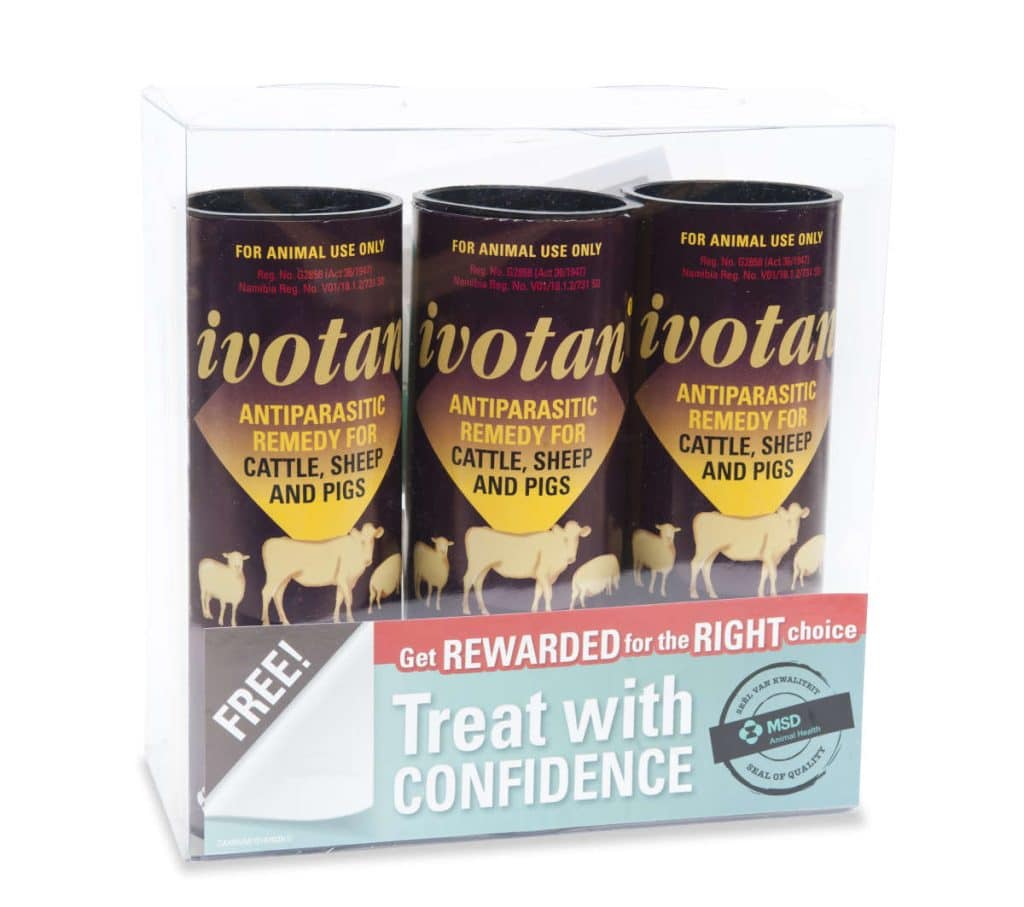
Ivotan®: This 1 % ivermectin will remove the ticks that are currently sucking blood from your animals. The mode of action means it does not work immediately, but rather after the product has had enough time to be absorbed into the bloodstream. It is ideal to use in winter as the tick burden is low.
Ivotan® Reg. No. G2858 (Act 36/1947); Namibia
Reg. No. V01/18.1.2/731 NS0. Contains
ivermectin 1 % m/v.
Blocking: This method requires injecting animals with Reverin LA 230 on day seven, 14 and 21, regardless of whether they are showing signs of disease. This decreases the heartwater protozoa load in the blood to a level where it cannot cause disease. It is also crucial to dip animals that were bought in heartwater-free areas, and to put them on the blocking programme to reduce the parasite load in their bodies and blood.
Calves and lambs are born with a variable level of immunity to heartwater, provided they suckled enough colostrum (here, the quality of the colostrum is key). This immunity, however, is short lived. Calves lose immunity at four weeks of age and lambs at three weeks. Hence, they need to be blocked to protect them from dying due to heartwater infection.
Vaccination: Heartwater vaccine can be given to susceptible animals before the risk period. It is usually administered to calves (one month of age) and lambs (one week old) with strict monitoring for reactions and temperature changes. It is compulsory to inject Reverin LA 230 at 14 days (calves) and eleven days (lambs) after vaccination. Vaccination is normally done in areas where heartwater is endemic.
Outbreak management
If there are frequent and fatal cases of heartwater in a herd, the following methods can help to stop the outbreak:
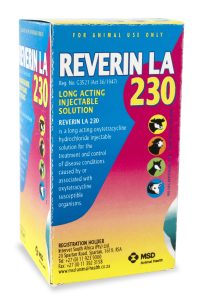
Killing the protozoa: Injecting all animals with Reverin LA 230 will kill the heartwater parasite in their blood and break the cycle of transmission.
Reverin LA 230 Reg. No. G3521 (Act 36/1947).
Each mℓ contains 230 mg Oxytetracycline
hydrochloride 23 % m/v.

Immune booster: Immunovite® will provide the nutrients and strengthen the immune system so it can effectively clear the protozoa from the animal. The selenium in Immunovite® will help fight inflammation. It also contains some probiotics and vitamins to help animalsthat are reluctant to feed.
Immunovite® Reg. No. V24724 (Act 36/1947). Each 100 mℓ contains Bacillus amyloliquefaciens CECT 5940 2 x 1010 CFU, fulvic acid 20 000 mg, selenium, as organic chelated proteinate complex 5 mg, magnesium 500 mg, calcium 720 mg, sodium chloride 775 mg, potassium chloride 550 mg, metabolisable energy 200 KJ, vitamin A 100 000 IU, vitamin D₃ 5 000 IU, vitamin E 300 IU, vitamin K₃ 20 mg, vitamin B₁ 25 mg, vitamin B₂ 40 mg, vitamin B₆ 50 mg, vitamin B₁₂ 0,3 mg, vitamin C 300 mg, niacin 200 mg, pantothenic acid 60 mg, folic acid 13 mg and biotin 1 mg.
Tick control: You need to get rid of the ticks already on your animals by using a pour-on dip such as Delete® All. If tick numbers are high, Taktic® Cattle Spray will remove them faster. This must be followed by injectable products such as Solution® 3.5% LA for adult animals and Ivotan® for animals younger than four months.
Anti-inflammatory: One of the reasons heartwater kills is due to the swelling of and fluid in the brain. An anti-inflammatory containing flunixin meglumine will help reduce brain swelling and fluid accumulation caused by the protozoa.
For more information, contact your MSD Animal Health representative.


